Contract Law and Company Directors
VerifiedAdded on 2020/05/28
|11
|2357
|29
AI Summary
This assignment delves into a contractual dispute involving a company, its directors, and a supplier named CTC Ltd. The managing director of the company, exceeding his authority and without board approval, entered into a contract with CTC for television orders worth over $500,000. The legal principles surrounding agency relationships, corporate constitution, and directors' duties are examined to determine liability and potential remedies in this scenario. Relevant case law like *Yin Kwan v, Eastern Insurance Co Ltd* and *Watteau v Fenwick* is analyzed to provide a comprehensive understanding of the legal complexities involved.
Contribute Materials
Your contribution can guide someone’s learning journey. Share your
documents today.
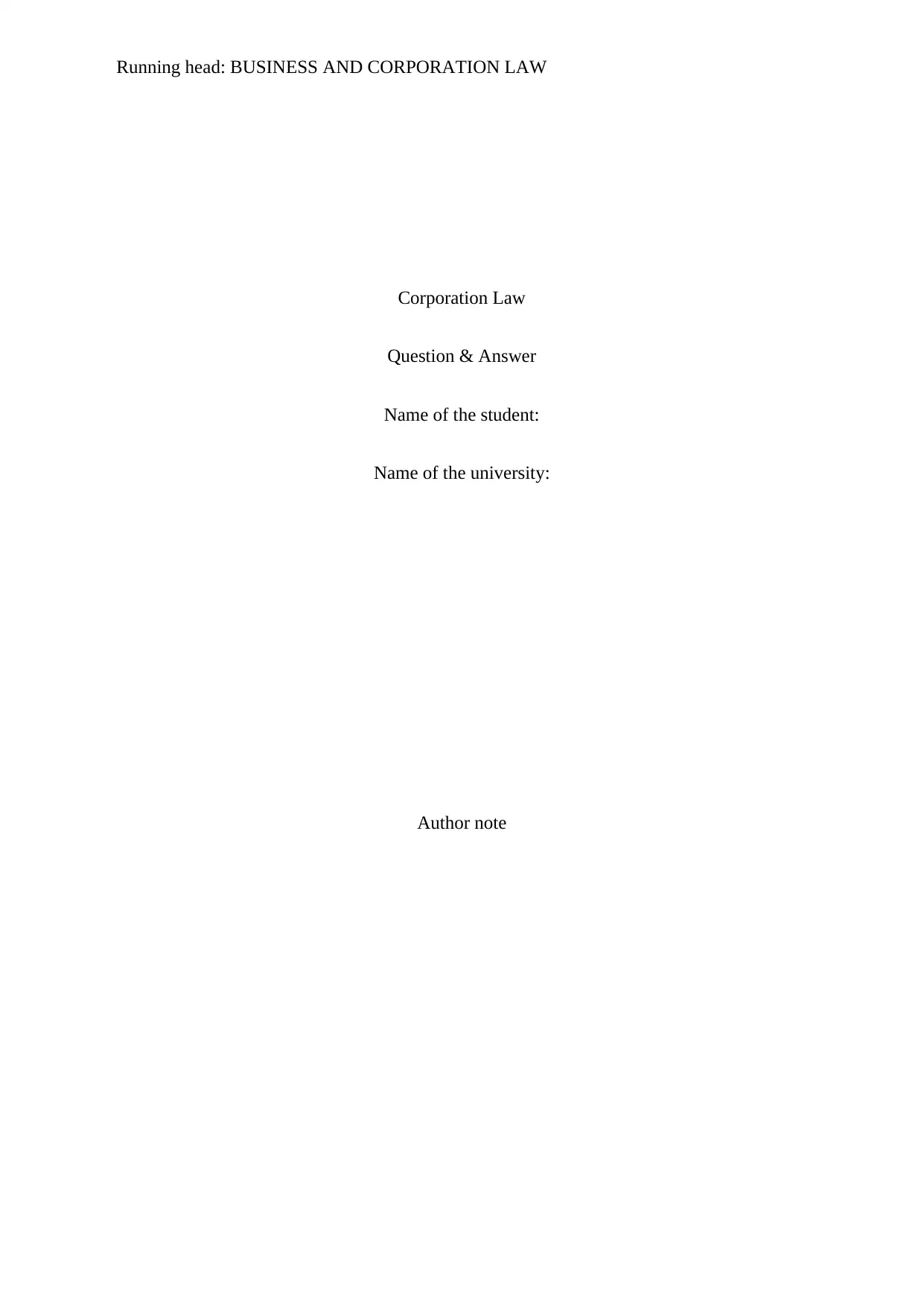
Running head: BUSINESS AND CORPORATION LAW
Corporation Law
Question & Answer
Name of the student:
Name of the university:
Author note
Corporation Law
Question & Answer
Name of the student:
Name of the university:
Author note
Secure Best Marks with AI Grader
Need help grading? Try our AI Grader for instant feedback on your assignments.
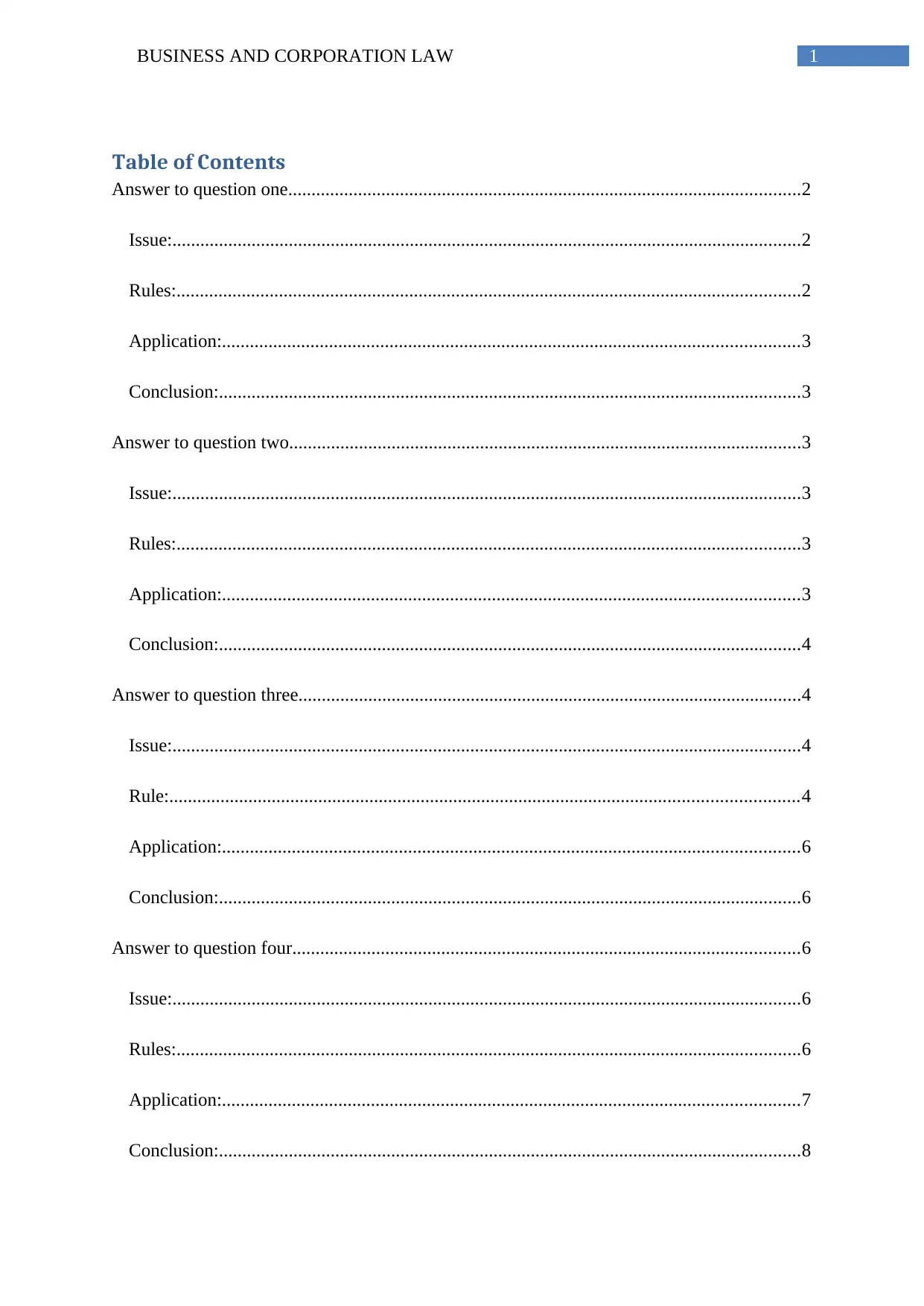
1BUSINESS AND CORPORATION LAW
Table of Contents
Answer to question one..............................................................................................................2
Issue:.......................................................................................................................................2
Rules:......................................................................................................................................2
Application:............................................................................................................................3
Conclusion:.............................................................................................................................3
Answer to question two..............................................................................................................3
Issue:.......................................................................................................................................3
Rules:......................................................................................................................................3
Application:............................................................................................................................3
Conclusion:.............................................................................................................................4
Answer to question three............................................................................................................4
Issue:.......................................................................................................................................4
Rule:.......................................................................................................................................4
Application:............................................................................................................................6
Conclusion:.............................................................................................................................6
Answer to question four.............................................................................................................6
Issue:.......................................................................................................................................6
Rules:......................................................................................................................................6
Application:............................................................................................................................7
Conclusion:.............................................................................................................................8
Table of Contents
Answer to question one..............................................................................................................2
Issue:.......................................................................................................................................2
Rules:......................................................................................................................................2
Application:............................................................................................................................3
Conclusion:.............................................................................................................................3
Answer to question two..............................................................................................................3
Issue:.......................................................................................................................................3
Rules:......................................................................................................................................3
Application:............................................................................................................................3
Conclusion:.............................................................................................................................4
Answer to question three............................................................................................................4
Issue:.......................................................................................................................................4
Rule:.......................................................................................................................................4
Application:............................................................................................................................6
Conclusion:.............................................................................................................................6
Answer to question four.............................................................................................................6
Issue:.......................................................................................................................................6
Rules:......................................................................................................................................6
Application:............................................................................................................................7
Conclusion:.............................................................................................................................8
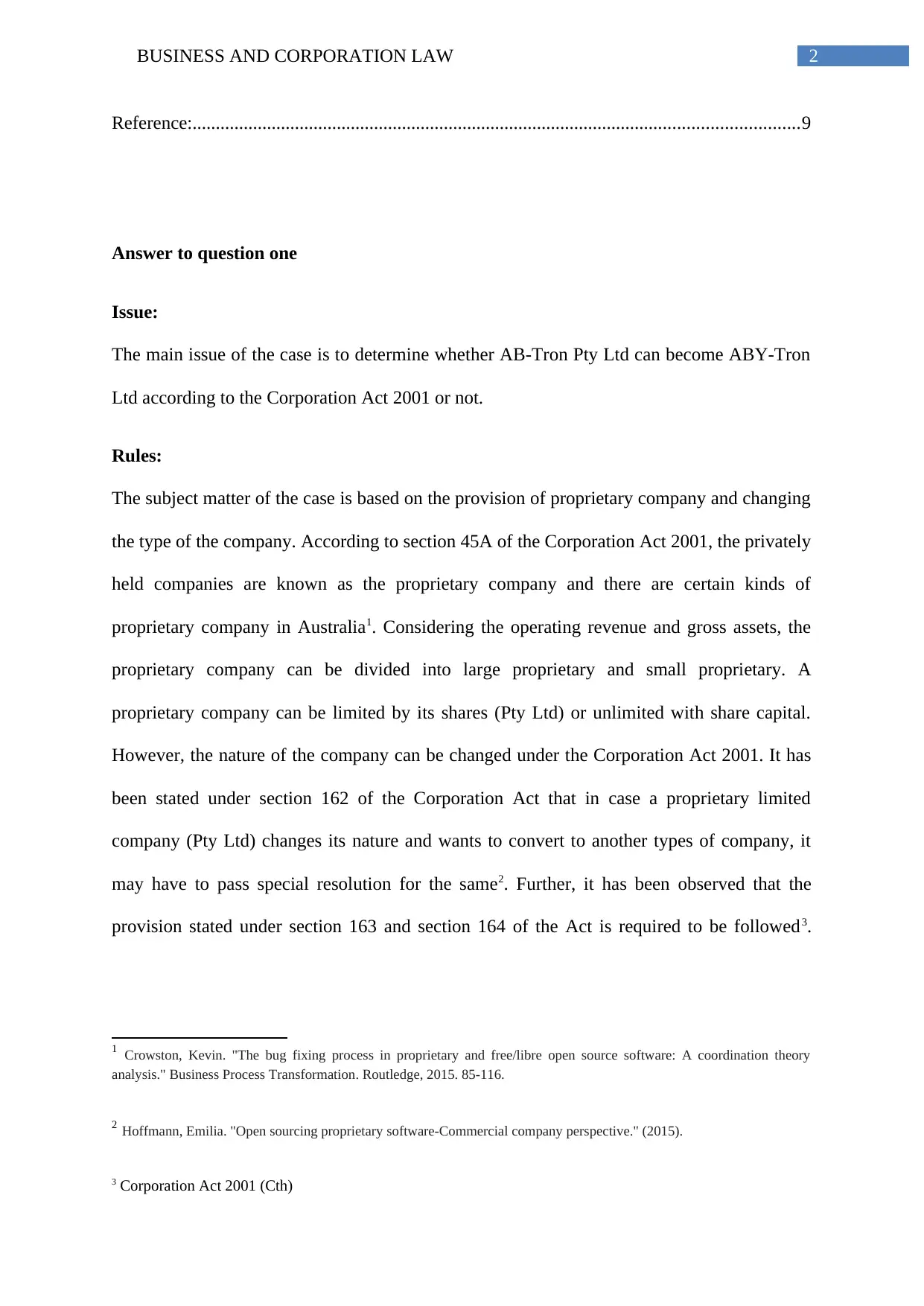
2BUSINESS AND CORPORATION LAW
Reference:..................................................................................................................................9
Answer to question one
Issue:
The main issue of the case is to determine whether AB-Tron Pty Ltd can become ABY-Tron
Ltd according to the Corporation Act 2001 or not.
Rules:
The subject matter of the case is based on the provision of proprietary company and changing
the type of the company. According to section 45A of the Corporation Act 2001, the privately
held companies are known as the proprietary company and there are certain kinds of
proprietary company in Australia1. Considering the operating revenue and gross assets, the
proprietary company can be divided into large proprietary and small proprietary. A
proprietary company can be limited by its shares (Pty Ltd) or unlimited with share capital.
However, the nature of the company can be changed under the Corporation Act 2001. It has
been stated under section 162 of the Corporation Act that in case a proprietary limited
company (Pty Ltd) changes its nature and wants to convert to another types of company, it
may have to pass special resolution for the same2. Further, it has been observed that the
provision stated under section 163 and section 164 of the Act is required to be followed3.
1 Crowston, Kevin. "The bug fixing process in proprietary and free/libre open source software: A coordination theory
analysis." Business Process Transformation. Routledge, 2015. 85-116.
2 Hoffmann, Emilia. "Open sourcing proprietary software-Commercial company perspective." (2015).
3 Corporation Act 2001 (Cth)
Reference:..................................................................................................................................9
Answer to question one
Issue:
The main issue of the case is to determine whether AB-Tron Pty Ltd can become ABY-Tron
Ltd according to the Corporation Act 2001 or not.
Rules:
The subject matter of the case is based on the provision of proprietary company and changing
the type of the company. According to section 45A of the Corporation Act 2001, the privately
held companies are known as the proprietary company and there are certain kinds of
proprietary company in Australia1. Considering the operating revenue and gross assets, the
proprietary company can be divided into large proprietary and small proprietary. A
proprietary company can be limited by its shares (Pty Ltd) or unlimited with share capital.
However, the nature of the company can be changed under the Corporation Act 2001. It has
been stated under section 162 of the Corporation Act that in case a proprietary limited
company (Pty Ltd) changes its nature and wants to convert to another types of company, it
may have to pass special resolution for the same2. Further, it has been observed that the
provision stated under section 163 and section 164 of the Act is required to be followed3.
1 Crowston, Kevin. "The bug fixing process in proprietary and free/libre open source software: A coordination theory
analysis." Business Process Transformation. Routledge, 2015. 85-116.
2 Hoffmann, Emilia. "Open sourcing proprietary software-Commercial company perspective." (2015).
3 Corporation Act 2001 (Cth)
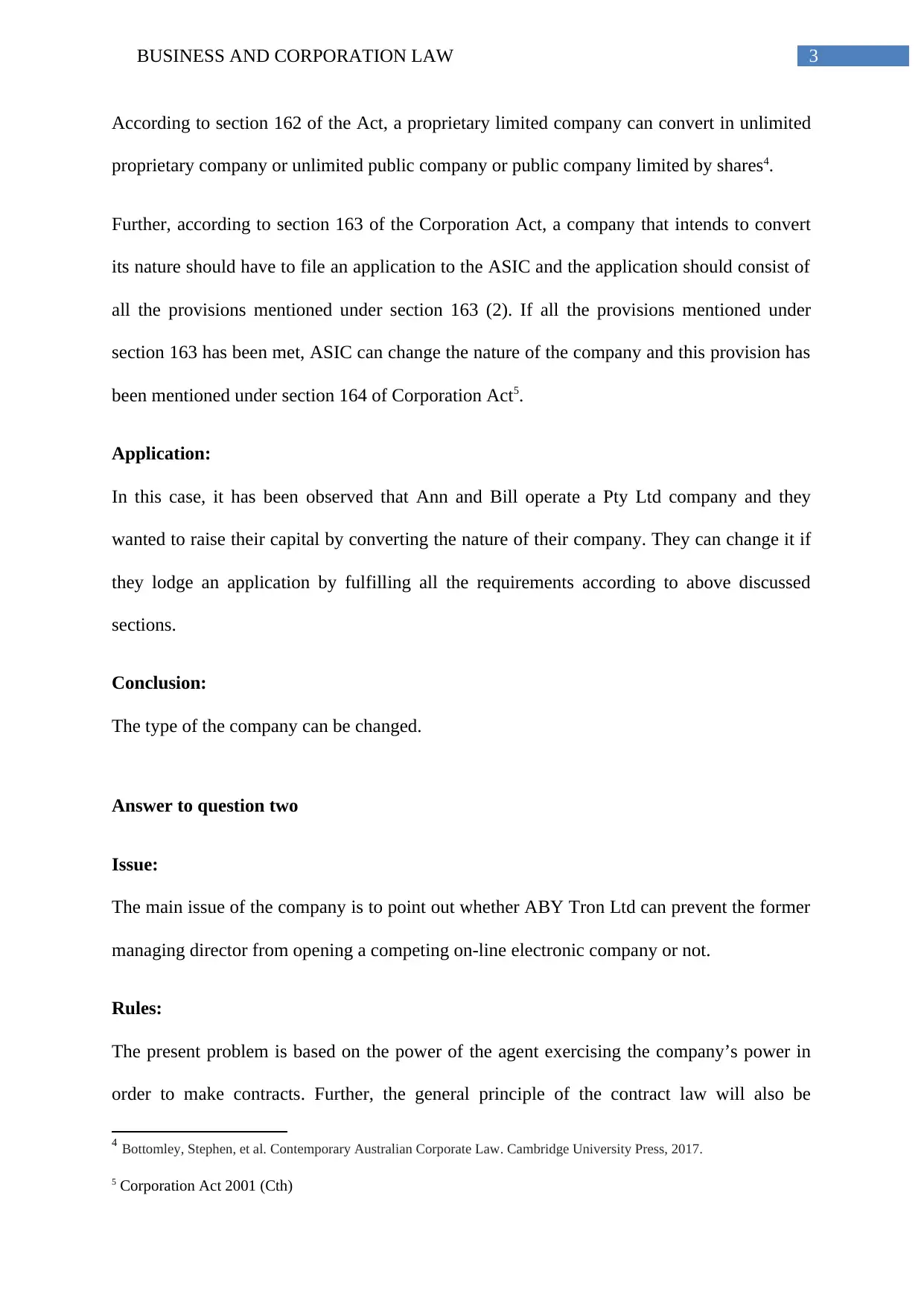
3BUSINESS AND CORPORATION LAW
According to section 162 of the Act, a proprietary limited company can convert in unlimited
proprietary company or unlimited public company or public company limited by shares4.
Further, according to section 163 of the Corporation Act, a company that intends to convert
its nature should have to file an application to the ASIC and the application should consist of
all the provisions mentioned under section 163 (2). If all the provisions mentioned under
section 163 has been met, ASIC can change the nature of the company and this provision has
been mentioned under section 164 of Corporation Act5.
Application:
In this case, it has been observed that Ann and Bill operate a Pty Ltd company and they
wanted to raise their capital by converting the nature of their company. They can change it if
they lodge an application by fulfilling all the requirements according to above discussed
sections.
Conclusion:
The type of the company can be changed.
Answer to question two
Issue:
The main issue of the company is to point out whether ABY Tron Ltd can prevent the former
managing director from opening a competing on-line electronic company or not.
Rules:
The present problem is based on the power of the agent exercising the company’s power in
order to make contracts. Further, the general principle of the contract law will also be
4 Bottomley, Stephen, et al. Contemporary Australian Corporate Law. Cambridge University Press, 2017.
5 Corporation Act 2001 (Cth)
According to section 162 of the Act, a proprietary limited company can convert in unlimited
proprietary company or unlimited public company or public company limited by shares4.
Further, according to section 163 of the Corporation Act, a company that intends to convert
its nature should have to file an application to the ASIC and the application should consist of
all the provisions mentioned under section 163 (2). If all the provisions mentioned under
section 163 has been met, ASIC can change the nature of the company and this provision has
been mentioned under section 164 of Corporation Act5.
Application:
In this case, it has been observed that Ann and Bill operate a Pty Ltd company and they
wanted to raise their capital by converting the nature of their company. They can change it if
they lodge an application by fulfilling all the requirements according to above discussed
sections.
Conclusion:
The type of the company can be changed.
Answer to question two
Issue:
The main issue of the company is to point out whether ABY Tron Ltd can prevent the former
managing director from opening a competing on-line electronic company or not.
Rules:
The present problem is based on the power of the agent exercising the company’s power in
order to make contracts. Further, the general principle of the contract law will also be
4 Bottomley, Stephen, et al. Contemporary Australian Corporate Law. Cambridge University Press, 2017.
5 Corporation Act 2001 (Cth)
Secure Best Marks with AI Grader
Need help grading? Try our AI Grader for instant feedback on your assignments.
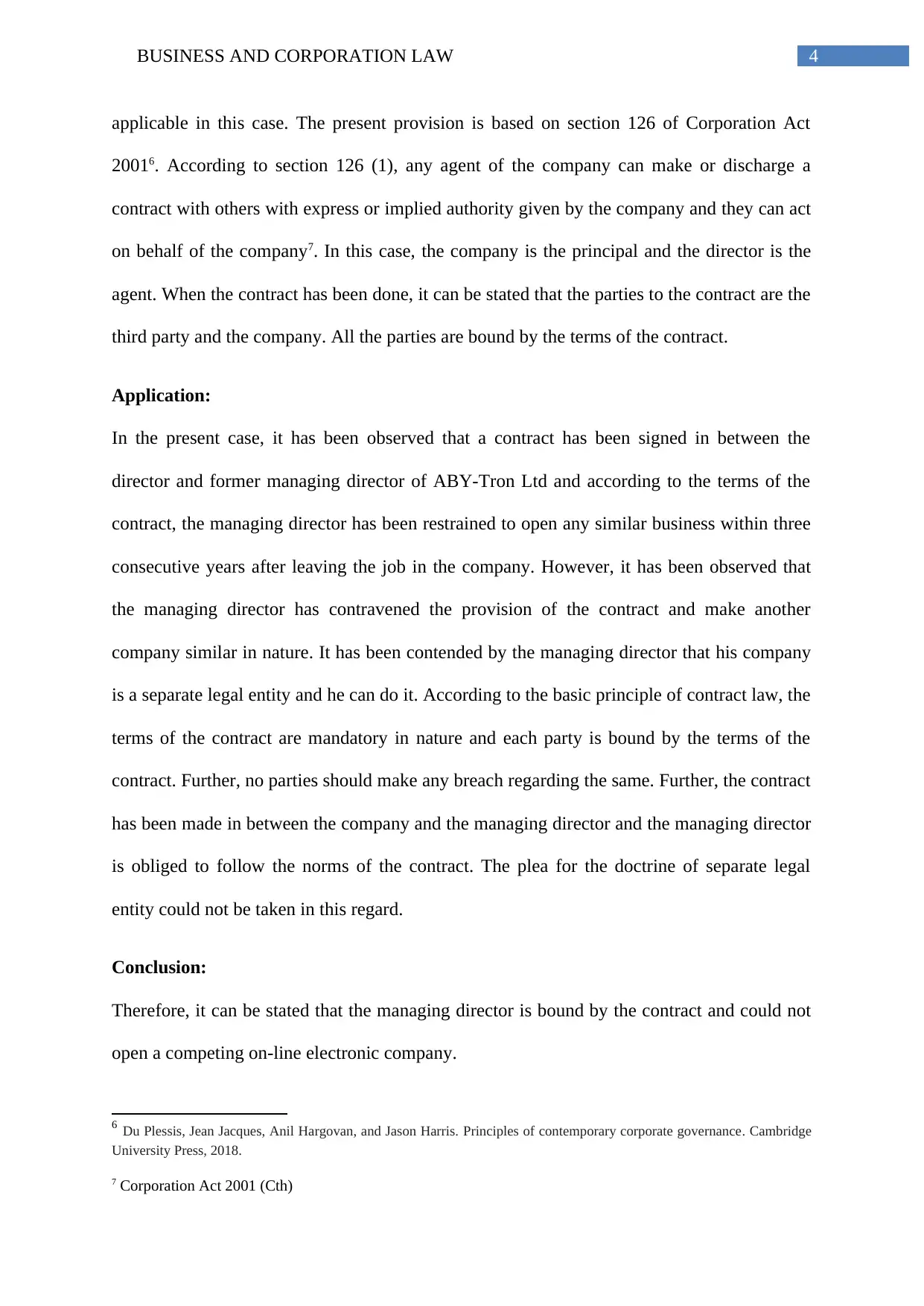
4BUSINESS AND CORPORATION LAW
applicable in this case. The present provision is based on section 126 of Corporation Act
20016. According to section 126 (1), any agent of the company can make or discharge a
contract with others with express or implied authority given by the company and they can act
on behalf of the company7. In this case, the company is the principal and the director is the
agent. When the contract has been done, it can be stated that the parties to the contract are the
third party and the company. All the parties are bound by the terms of the contract.
Application:
In the present case, it has been observed that a contract has been signed in between the
director and former managing director of ABY-Tron Ltd and according to the terms of the
contract, the managing director has been restrained to open any similar business within three
consecutive years after leaving the job in the company. However, it has been observed that
the managing director has contravened the provision of the contract and make another
company similar in nature. It has been contended by the managing director that his company
is a separate legal entity and he can do it. According to the basic principle of contract law, the
terms of the contract are mandatory in nature and each party is bound by the terms of the
contract. Further, no parties should make any breach regarding the same. Further, the contract
has been made in between the company and the managing director and the managing director
is obliged to follow the norms of the contract. The plea for the doctrine of separate legal
entity could not be taken in this regard.
Conclusion:
Therefore, it can be stated that the managing director is bound by the contract and could not
open a competing on-line electronic company.
6 Du Plessis, Jean Jacques, Anil Hargovan, and Jason Harris. Principles of contemporary corporate governance. Cambridge
University Press, 2018.
7 Corporation Act 2001 (Cth)
applicable in this case. The present provision is based on section 126 of Corporation Act
20016. According to section 126 (1), any agent of the company can make or discharge a
contract with others with express or implied authority given by the company and they can act
on behalf of the company7. In this case, the company is the principal and the director is the
agent. When the contract has been done, it can be stated that the parties to the contract are the
third party and the company. All the parties are bound by the terms of the contract.
Application:
In the present case, it has been observed that a contract has been signed in between the
director and former managing director of ABY-Tron Ltd and according to the terms of the
contract, the managing director has been restrained to open any similar business within three
consecutive years after leaving the job in the company. However, it has been observed that
the managing director has contravened the provision of the contract and make another
company similar in nature. It has been contended by the managing director that his company
is a separate legal entity and he can do it. According to the basic principle of contract law, the
terms of the contract are mandatory in nature and each party is bound by the terms of the
contract. Further, no parties should make any breach regarding the same. Further, the contract
has been made in between the company and the managing director and the managing director
is obliged to follow the norms of the contract. The plea for the doctrine of separate legal
entity could not be taken in this regard.
Conclusion:
Therefore, it can be stated that the managing director is bound by the contract and could not
open a competing on-line electronic company.
6 Du Plessis, Jean Jacques, Anil Hargovan, and Jason Harris. Principles of contemporary corporate governance. Cambridge
University Press, 2018.
7 Corporation Act 2001 (Cth)
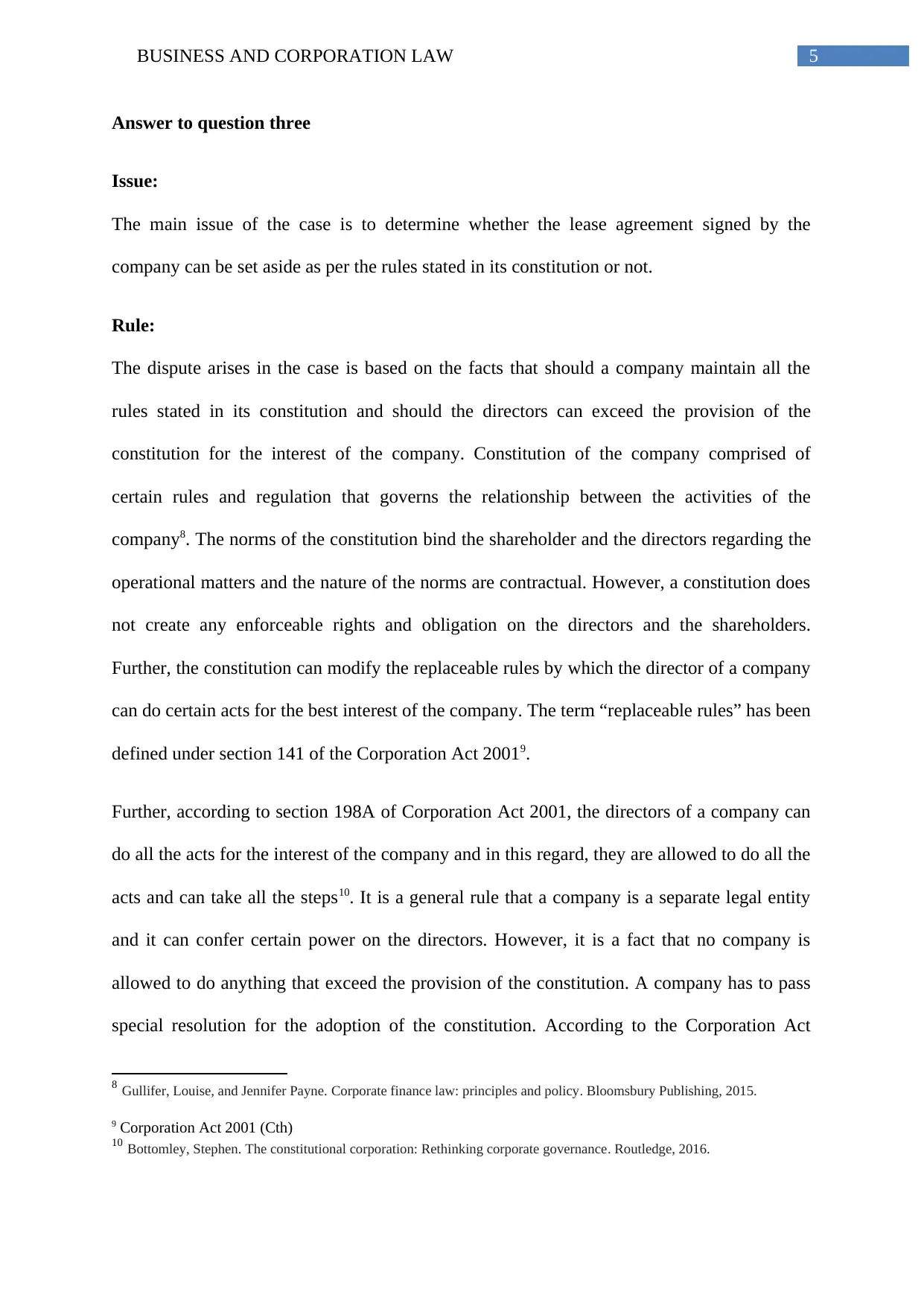
5BUSINESS AND CORPORATION LAW
Answer to question three
Issue:
The main issue of the case is to determine whether the lease agreement signed by the
company can be set aside as per the rules stated in its constitution or not.
Rule:
The dispute arises in the case is based on the facts that should a company maintain all the
rules stated in its constitution and should the directors can exceed the provision of the
constitution for the interest of the company. Constitution of the company comprised of
certain rules and regulation that governs the relationship between the activities of the
company8. The norms of the constitution bind the shareholder and the directors regarding the
operational matters and the nature of the norms are contractual. However, a constitution does
not create any enforceable rights and obligation on the directors and the shareholders.
Further, the constitution can modify the replaceable rules by which the director of a company
can do certain acts for the best interest of the company. The term “replaceable rules” has been
defined under section 141 of the Corporation Act 20019.
Further, according to section 198A of Corporation Act 2001, the directors of a company can
do all the acts for the interest of the company and in this regard, they are allowed to do all the
acts and can take all the steps10. It is a general rule that a company is a separate legal entity
and it can confer certain power on the directors. However, it is a fact that no company is
allowed to do anything that exceed the provision of the constitution. A company has to pass
special resolution for the adoption of the constitution. According to the Corporation Act
8 Gullifer, Louise, and Jennifer Payne. Corporate finance law: principles and policy. Bloomsbury Publishing, 2015.
9 Corporation Act 2001 (Cth)
10 Bottomley, Stephen. The constitutional corporation: Rethinking corporate governance. Routledge, 2016.
Answer to question three
Issue:
The main issue of the case is to determine whether the lease agreement signed by the
company can be set aside as per the rules stated in its constitution or not.
Rule:
The dispute arises in the case is based on the facts that should a company maintain all the
rules stated in its constitution and should the directors can exceed the provision of the
constitution for the interest of the company. Constitution of the company comprised of
certain rules and regulation that governs the relationship between the activities of the
company8. The norms of the constitution bind the shareholder and the directors regarding the
operational matters and the nature of the norms are contractual. However, a constitution does
not create any enforceable rights and obligation on the directors and the shareholders.
Further, the constitution can modify the replaceable rules by which the director of a company
can do certain acts for the best interest of the company. The term “replaceable rules” has been
defined under section 141 of the Corporation Act 20019.
Further, according to section 198A of Corporation Act 2001, the directors of a company can
do all the acts for the interest of the company and in this regard, they are allowed to do all the
acts and can take all the steps10. It is a general rule that a company is a separate legal entity
and it can confer certain power on the directors. However, it is a fact that no company is
allowed to do anything that exceed the provision of the constitution. A company has to pass
special resolution for the adoption of the constitution. According to the Corporation Act
8 Gullifer, Louise, and Jennifer Payne. Corporate finance law: principles and policy. Bloomsbury Publishing, 2015.
9 Corporation Act 2001 (Cth)
10 Bottomley, Stephen. The constitutional corporation: Rethinking corporate governance. Routledge, 2016.
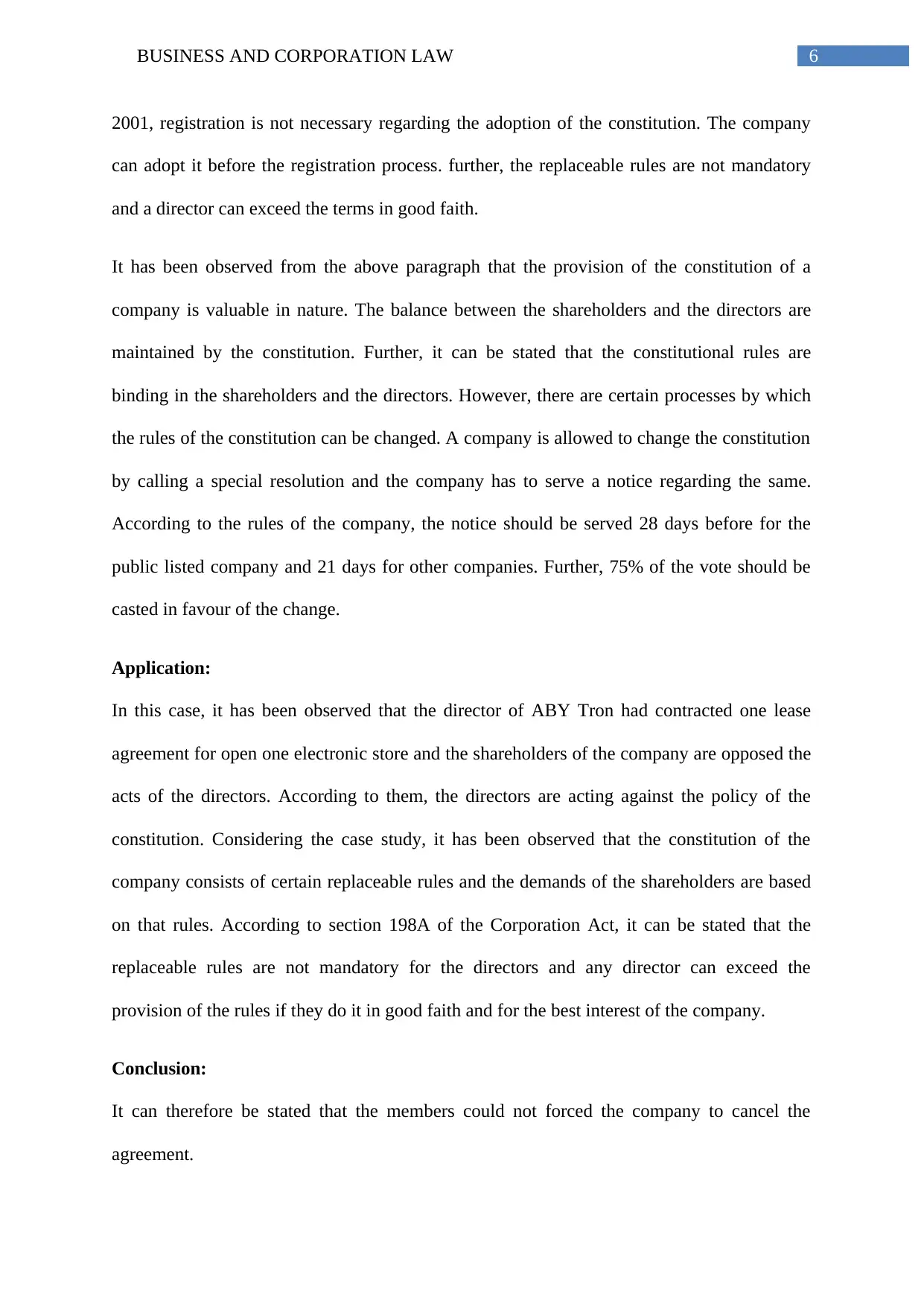
6BUSINESS AND CORPORATION LAW
2001, registration is not necessary regarding the adoption of the constitution. The company
can adopt it before the registration process. further, the replaceable rules are not mandatory
and a director can exceed the terms in good faith.
It has been observed from the above paragraph that the provision of the constitution of a
company is valuable in nature. The balance between the shareholders and the directors are
maintained by the constitution. Further, it can be stated that the constitutional rules are
binding in the shareholders and the directors. However, there are certain processes by which
the rules of the constitution can be changed. A company is allowed to change the constitution
by calling a special resolution and the company has to serve a notice regarding the same.
According to the rules of the company, the notice should be served 28 days before for the
public listed company and 21 days for other companies. Further, 75% of the vote should be
casted in favour of the change.
Application:
In this case, it has been observed that the director of ABY Tron had contracted one lease
agreement for open one electronic store and the shareholders of the company are opposed the
acts of the directors. According to them, the directors are acting against the policy of the
constitution. Considering the case study, it has been observed that the constitution of the
company consists of certain replaceable rules and the demands of the shareholders are based
on that rules. According to section 198A of the Corporation Act, it can be stated that the
replaceable rules are not mandatory for the directors and any director can exceed the
provision of the rules if they do it in good faith and for the best interest of the company.
Conclusion:
It can therefore be stated that the members could not forced the company to cancel the
agreement.
2001, registration is not necessary regarding the adoption of the constitution. The company
can adopt it before the registration process. further, the replaceable rules are not mandatory
and a director can exceed the terms in good faith.
It has been observed from the above paragraph that the provision of the constitution of a
company is valuable in nature. The balance between the shareholders and the directors are
maintained by the constitution. Further, it can be stated that the constitutional rules are
binding in the shareholders and the directors. However, there are certain processes by which
the rules of the constitution can be changed. A company is allowed to change the constitution
by calling a special resolution and the company has to serve a notice regarding the same.
According to the rules of the company, the notice should be served 28 days before for the
public listed company and 21 days for other companies. Further, 75% of the vote should be
casted in favour of the change.
Application:
In this case, it has been observed that the director of ABY Tron had contracted one lease
agreement for open one electronic store and the shareholders of the company are opposed the
acts of the directors. According to them, the directors are acting against the policy of the
constitution. Considering the case study, it has been observed that the constitution of the
company consists of certain replaceable rules and the demands of the shareholders are based
on that rules. According to section 198A of the Corporation Act, it can be stated that the
replaceable rules are not mandatory for the directors and any director can exceed the
provision of the rules if they do it in good faith and for the best interest of the company.
Conclusion:
It can therefore be stated that the members could not forced the company to cancel the
agreement.
Paraphrase This Document
Need a fresh take? Get an instant paraphrase of this document with our AI Paraphraser
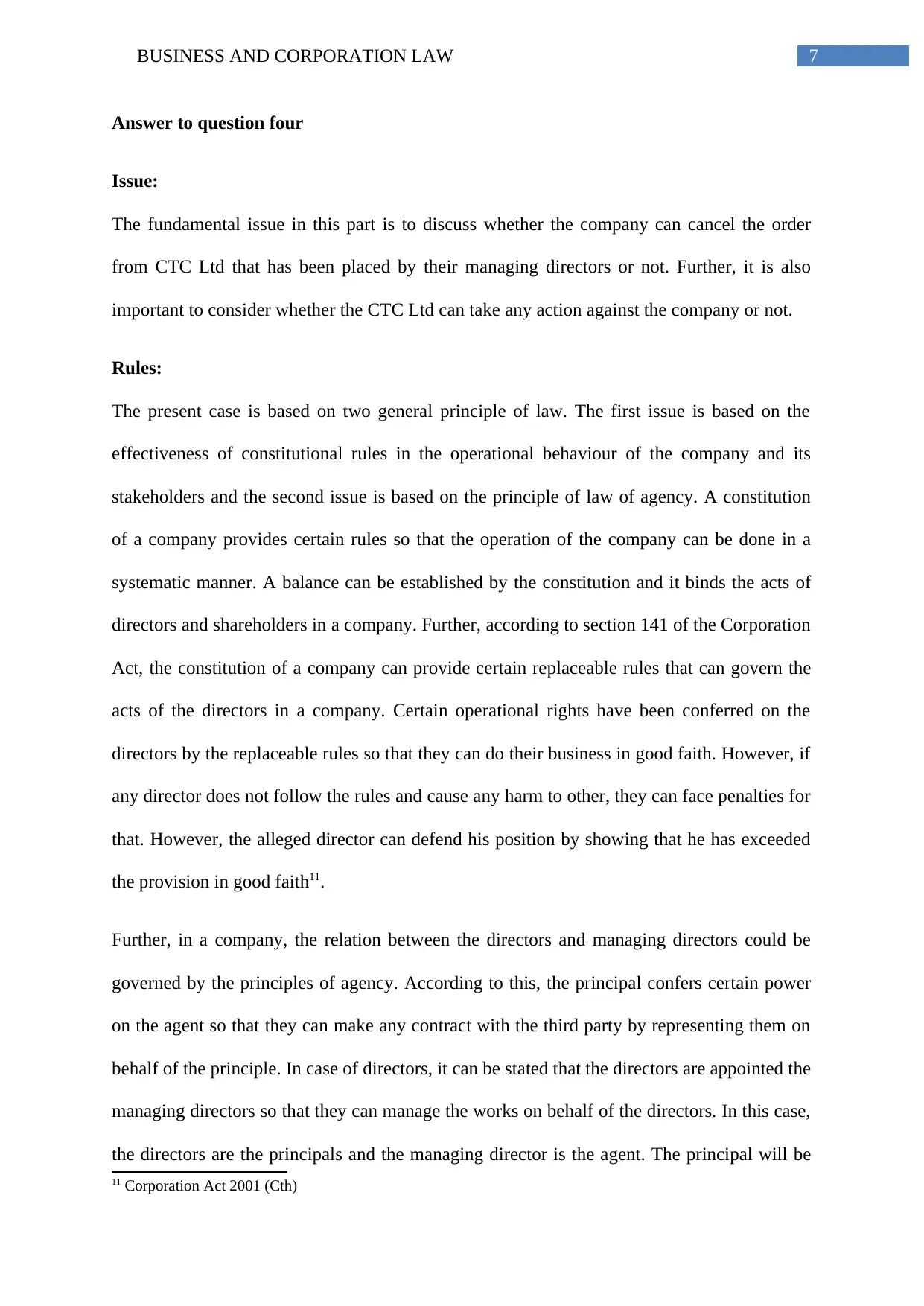
7BUSINESS AND CORPORATION LAW
Answer to question four
Issue:
The fundamental issue in this part is to discuss whether the company can cancel the order
from CTC Ltd that has been placed by their managing directors or not. Further, it is also
important to consider whether the CTC Ltd can take any action against the company or not.
Rules:
The present case is based on two general principle of law. The first issue is based on the
effectiveness of constitutional rules in the operational behaviour of the company and its
stakeholders and the second issue is based on the principle of law of agency. A constitution
of a company provides certain rules so that the operation of the company can be done in a
systematic manner. A balance can be established by the constitution and it binds the acts of
directors and shareholders in a company. Further, according to section 141 of the Corporation
Act, the constitution of a company can provide certain replaceable rules that can govern the
acts of the directors in a company. Certain operational rights have been conferred on the
directors by the replaceable rules so that they can do their business in good faith. However, if
any director does not follow the rules and cause any harm to other, they can face penalties for
that. However, the alleged director can defend his position by showing that he has exceeded
the provision in good faith11.
Further, in a company, the relation between the directors and managing directors could be
governed by the principles of agency. According to this, the principal confers certain power
on the agent so that they can make any contract with the third party by representing them on
behalf of the principle. In case of directors, it can be stated that the directors are appointed the
managing directors so that they can manage the works on behalf of the directors. In this case,
the directors are the principals and the managing director is the agent. The principal will be
11 Corporation Act 2001 (Cth)
Answer to question four
Issue:
The fundamental issue in this part is to discuss whether the company can cancel the order
from CTC Ltd that has been placed by their managing directors or not. Further, it is also
important to consider whether the CTC Ltd can take any action against the company or not.
Rules:
The present case is based on two general principle of law. The first issue is based on the
effectiveness of constitutional rules in the operational behaviour of the company and its
stakeholders and the second issue is based on the principle of law of agency. A constitution
of a company provides certain rules so that the operation of the company can be done in a
systematic manner. A balance can be established by the constitution and it binds the acts of
directors and shareholders in a company. Further, according to section 141 of the Corporation
Act, the constitution of a company can provide certain replaceable rules that can govern the
acts of the directors in a company. Certain operational rights have been conferred on the
directors by the replaceable rules so that they can do their business in good faith. However, if
any director does not follow the rules and cause any harm to other, they can face penalties for
that. However, the alleged director can defend his position by showing that he has exceeded
the provision in good faith11.
Further, in a company, the relation between the directors and managing directors could be
governed by the principles of agency. According to this, the principal confers certain power
on the agent so that they can make any contract with the third party by representing them on
behalf of the principle. In case of directors, it can be stated that the directors are appointed the
managing directors so that they can manage the works on behalf of the directors. In this case,
the directors are the principals and the managing director is the agent. The principal will be
11 Corporation Act 2001 (Cth)
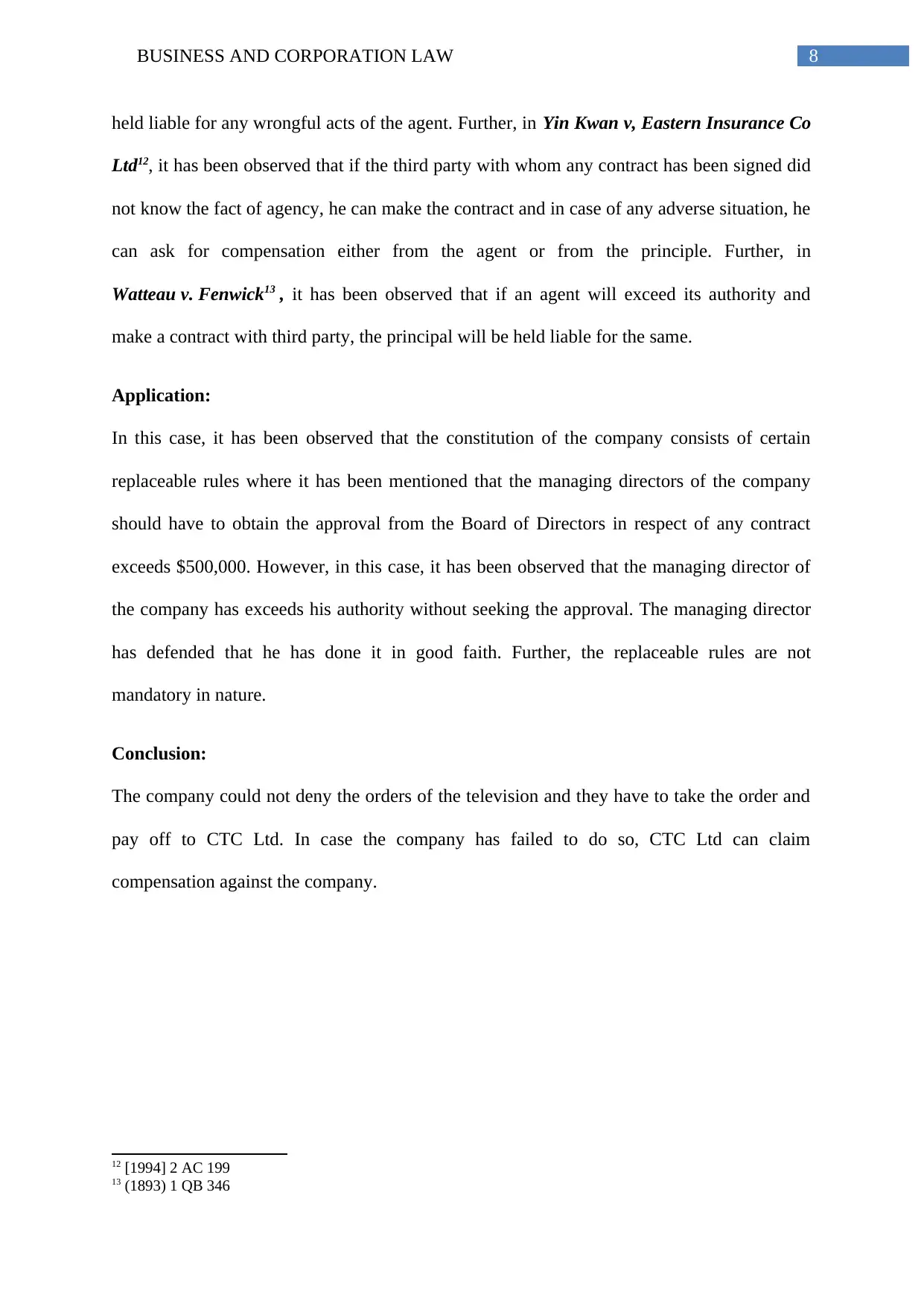
8BUSINESS AND CORPORATION LAW
held liable for any wrongful acts of the agent. Further, in Yin Kwan v, Eastern Insurance Co
Ltd12, it has been observed that if the third party with whom any contract has been signed did
not know the fact of agency, he can make the contract and in case of any adverse situation, he
can ask for compensation either from the agent or from the principle. Further, in
Watteau v. Fenwick13 , it has been observed that if an agent will exceed its authority and
make a contract with third party, the principal will be held liable for the same.
Application:
In this case, it has been observed that the constitution of the company consists of certain
replaceable rules where it has been mentioned that the managing directors of the company
should have to obtain the approval from the Board of Directors in respect of any contract
exceeds $500,000. However, in this case, it has been observed that the managing director of
the company has exceeds his authority without seeking the approval. The managing director
has defended that he has done it in good faith. Further, the replaceable rules are not
mandatory in nature.
Conclusion:
The company could not deny the orders of the television and they have to take the order and
pay off to CTC Ltd. In case the company has failed to do so, CTC Ltd can claim
compensation against the company.
12 [1994] 2 AC 199
13 (1893) 1 QB 346
held liable for any wrongful acts of the agent. Further, in Yin Kwan v, Eastern Insurance Co
Ltd12, it has been observed that if the third party with whom any contract has been signed did
not know the fact of agency, he can make the contract and in case of any adverse situation, he
can ask for compensation either from the agent or from the principle. Further, in
Watteau v. Fenwick13 , it has been observed that if an agent will exceed its authority and
make a contract with third party, the principal will be held liable for the same.
Application:
In this case, it has been observed that the constitution of the company consists of certain
replaceable rules where it has been mentioned that the managing directors of the company
should have to obtain the approval from the Board of Directors in respect of any contract
exceeds $500,000. However, in this case, it has been observed that the managing director of
the company has exceeds his authority without seeking the approval. The managing director
has defended that he has done it in good faith. Further, the replaceable rules are not
mandatory in nature.
Conclusion:
The company could not deny the orders of the television and they have to take the order and
pay off to CTC Ltd. In case the company has failed to do so, CTC Ltd can claim
compensation against the company.
12 [1994] 2 AC 199
13 (1893) 1 QB 346
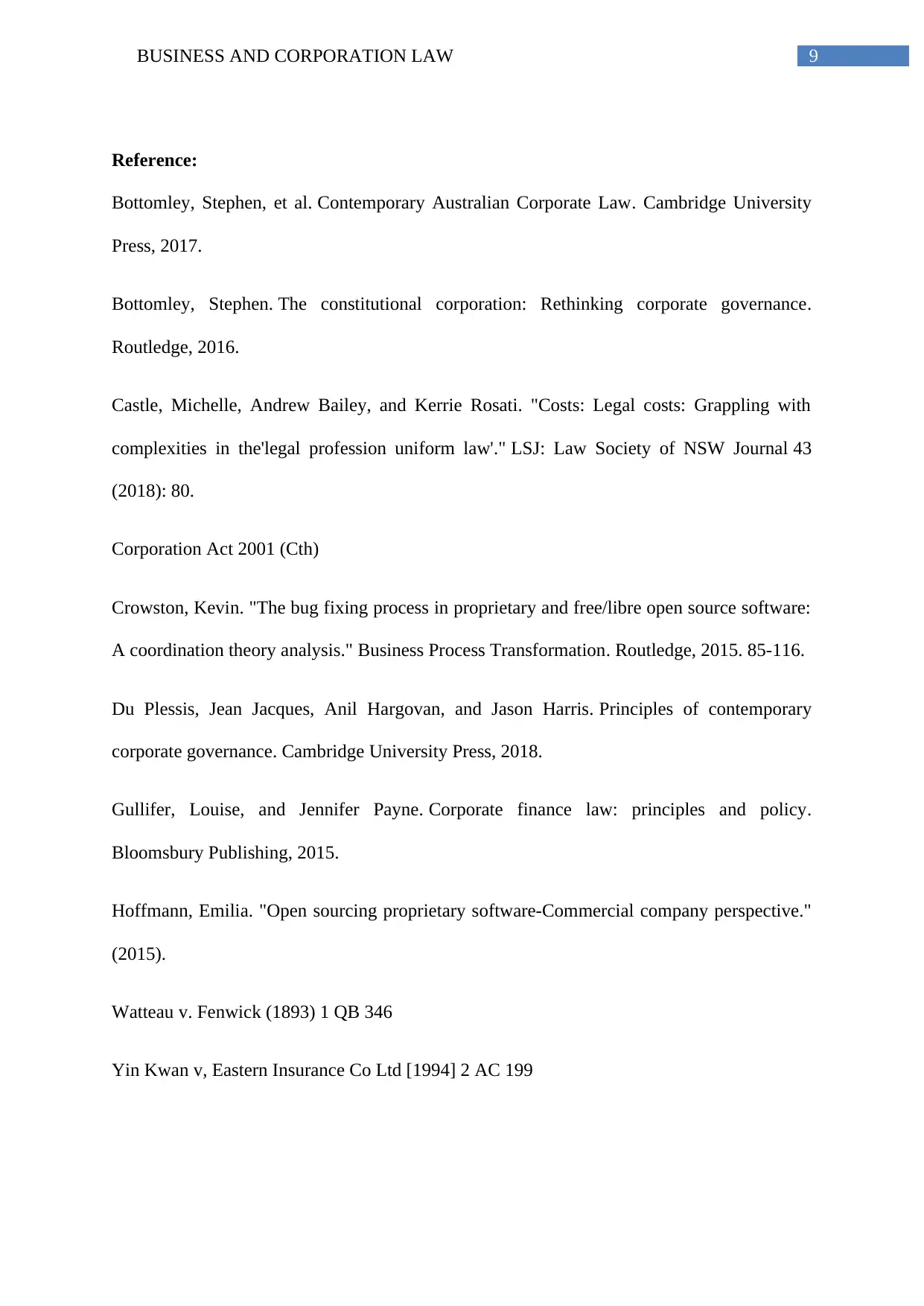
9BUSINESS AND CORPORATION LAW
Reference:
Bottomley, Stephen, et al. Contemporary Australian Corporate Law. Cambridge University
Press, 2017.
Bottomley, Stephen. The constitutional corporation: Rethinking corporate governance.
Routledge, 2016.
Castle, Michelle, Andrew Bailey, and Kerrie Rosati. "Costs: Legal costs: Grappling with
complexities in the'legal profession uniform law'." LSJ: Law Society of NSW Journal 43
(2018): 80.
Corporation Act 2001 (Cth)
Crowston, Kevin. "The bug fixing process in proprietary and free/libre open source software:
A coordination theory analysis." Business Process Transformation. Routledge, 2015. 85-116.
Du Plessis, Jean Jacques, Anil Hargovan, and Jason Harris. Principles of contemporary
corporate governance. Cambridge University Press, 2018.
Gullifer, Louise, and Jennifer Payne. Corporate finance law: principles and policy.
Bloomsbury Publishing, 2015.
Hoffmann, Emilia. "Open sourcing proprietary software-Commercial company perspective."
(2015).
Watteau v. Fenwick (1893) 1 QB 346
Yin Kwan v, Eastern Insurance Co Ltd [1994] 2 AC 199
Reference:
Bottomley, Stephen, et al. Contemporary Australian Corporate Law. Cambridge University
Press, 2017.
Bottomley, Stephen. The constitutional corporation: Rethinking corporate governance.
Routledge, 2016.
Castle, Michelle, Andrew Bailey, and Kerrie Rosati. "Costs: Legal costs: Grappling with
complexities in the'legal profession uniform law'." LSJ: Law Society of NSW Journal 43
(2018): 80.
Corporation Act 2001 (Cth)
Crowston, Kevin. "The bug fixing process in proprietary and free/libre open source software:
A coordination theory analysis." Business Process Transformation. Routledge, 2015. 85-116.
Du Plessis, Jean Jacques, Anil Hargovan, and Jason Harris. Principles of contemporary
corporate governance. Cambridge University Press, 2018.
Gullifer, Louise, and Jennifer Payne. Corporate finance law: principles and policy.
Bloomsbury Publishing, 2015.
Hoffmann, Emilia. "Open sourcing proprietary software-Commercial company perspective."
(2015).
Watteau v. Fenwick (1893) 1 QB 346
Yin Kwan v, Eastern Insurance Co Ltd [1994] 2 AC 199
Secure Best Marks with AI Grader
Need help grading? Try our AI Grader for instant feedback on your assignments.
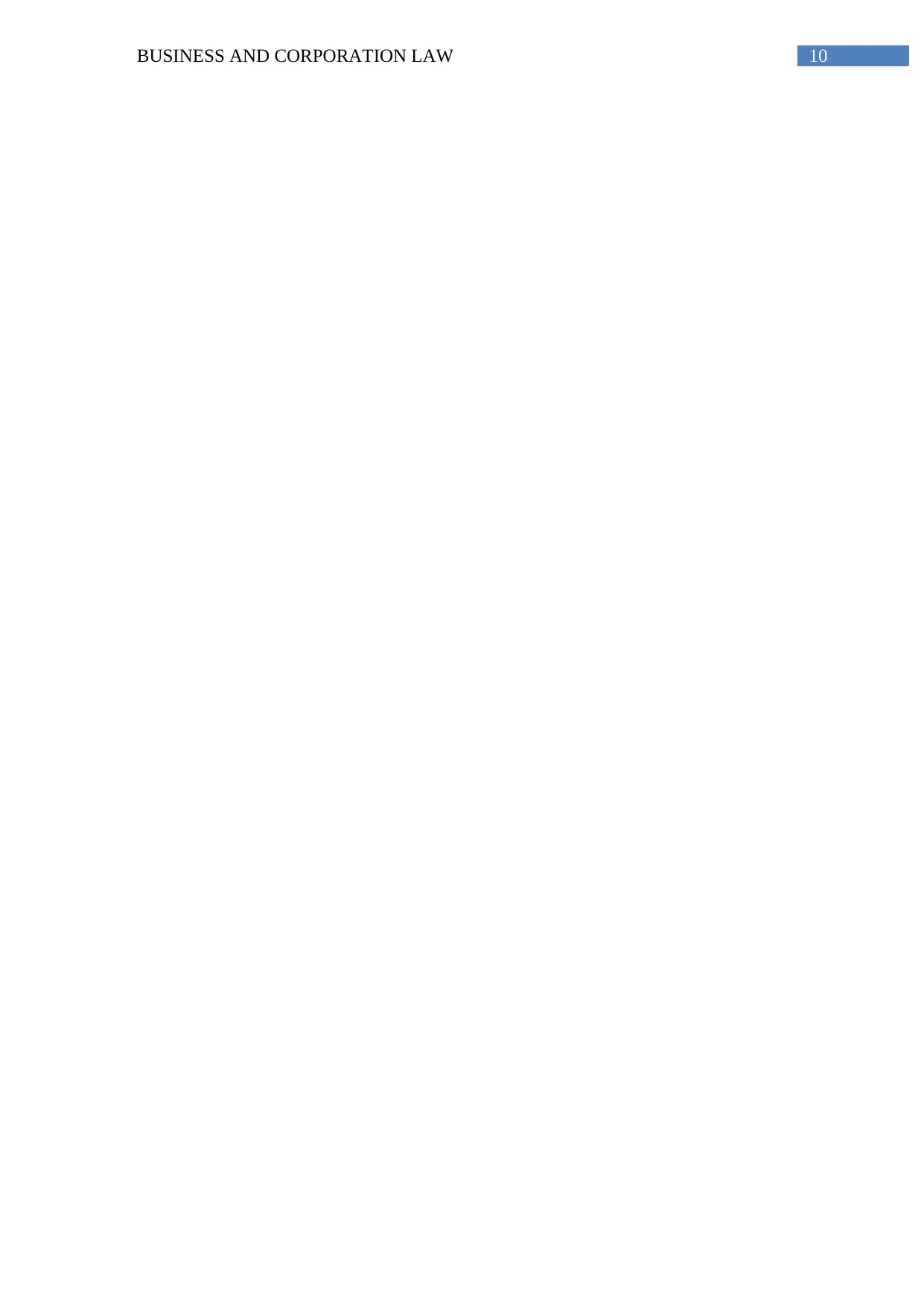
10BUSINESS AND CORPORATION LAW
1 out of 11
Related Documents
Your All-in-One AI-Powered Toolkit for Academic Success.
+13062052269
info@desklib.com
Available 24*7 on WhatsApp / Email
![[object Object]](/_next/static/media/star-bottom.7253800d.svg)
Unlock your academic potential
© 2024 | Zucol Services PVT LTD | All rights reserved.





